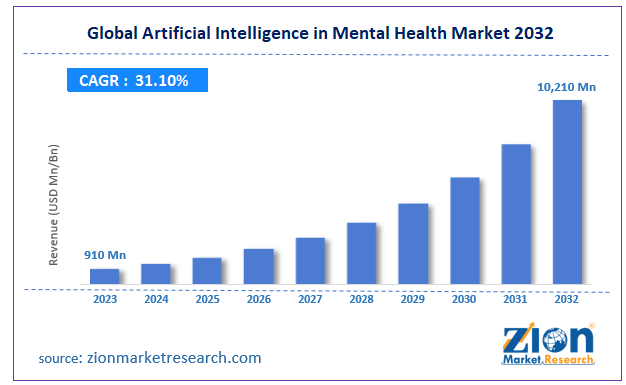Artificial Intelligence in Mental Health
A game-changer in the field of mental healthcare, artificial intelligence (AI) is improving patient outcomes and expanding access to mental health services through novel approaches to diagnosis, treatment, and support. A growing understanding of the importance of early diagnosis and customized treatment plans, as well as an increase in the global burden of mental health diseases, are driving the growth of artificial intelligence (AI) in mental health market.
The artificial intelligence in mental health market covers a wide range of products and services, from virtual assistants and predictive analytics to digital therapies and telepsychiatry, as well as systems for tracking mental health. With the increasing demand for mental health services, healthcare systems and providers are looking for ways to improve diagnosis, treatment delivery, and patient engagement. Artificial intelligence (AI) technologies offer scalable and cost-effective solutions for this problem.
Recent statistics show that the market for artificial intelligence (AI) in mental health is quite large, which is a reflection of the growing popularity of AI-driven solutions among healthcare providers, technology companies, and patients alike.

The global market for AI in mental health was valued at approximately USD 910 million in 2023 and is projected to reach around USD 10,210 million by 2032, expanding at a CAGR (compound annual growth rate) of about 31.1% from 2024 to 2032.
Download Report: https://www.zionmarketresearch.com/sample/artificial-intelligence-in-mental-health-market
Artificial Intelligence In Mental Health Companies:
- Woebot Health: Woebot Health, established in 2017, pioneers AI-driven mental health support with its chatbot offering personalized cognitive-behavioral therapy interventions, enhancing accessibility and scalability.
- Ginger: Since 2011, Ginger has excelled in providing on-demand mental healthcare via its mobile platform, blending therapy, coaching, and psychiatry services with AI insights for improved outcomes.
- Quartet Health: Quartet Health, founded in 2014, facilitates collaboration between patients, providers, and payers through its AI-powered platform, revolutionizing mental healthcare delivery and personalized care planning.
- Wysa: Established in 2015, Wysa offers an AI chatbot providing evidence-based emotional support and therapy, effectively aiding users in managing stress and anxiety.
- Ieso Digital Health: Since 2000, Ieso Digital Health has been a leader in online cognitive-behavioral therapy, utilizing AI to tailor treatments and improve accessibility globally.
- Cogniant: Founded in 2018, Cogniant develops digital therapeutics for mental health, integrating AI for personalized interventions, transforming patient outcomes and care delivery.
- Pear Therapeutics: Pear Therapeutics, established in 2013, pioneers prescription digital therapeutics for mental health, gaining regulatory approval for its effective interventions.
- NeuroFlow: NeuroFlow, since 2017, empowers mental healthcare with its platform, harnessing AI for data-driven insights and interventions, enhancing patient and care team collaboration.
- Ksana Health: Founded in 2019, Ksana Health utilizes AI-powered analytics to advance mental health diagnosis and treatment, attracting attention for its potential to revolutionize care delivery.
- Mindstrong Health: Established in 2014, Mindstrong Health leverages smartphone data and AI algorithms to passively monitor mental health, offering personalized interventions and garnering significant funding and partnerships.
There are exciting prospects for growth and innovation in the artificial intelligence (AI) mental health business as we reach the year 2032. With mental health illnesses impacting people all over the globe, there is a huge opportunity to improve mental health services in terms of accessibility, quality, and outcomes by using AI technologies into mental health treatment. Participants in the artificial intelligence (AI) industry for mental health have an opportunity to improve people’s mental health and the way healthcare is provided by utilizing AI-driven strategies.



